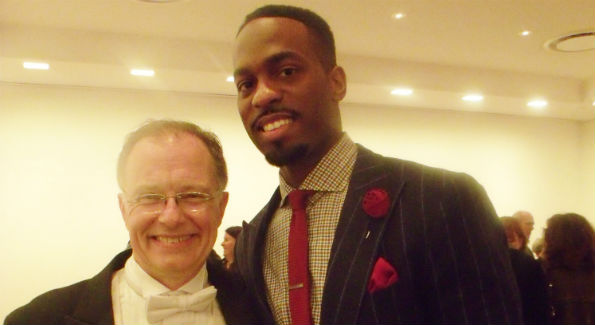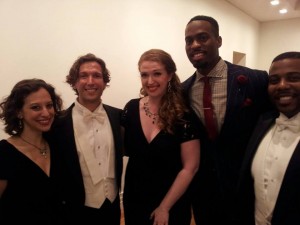Hometown star Soloman Howard made his Carnegie Hall debut with the Oratorio Society of New York.
By Patrick D. McCoy

Conductor Kent Tritle congratulates bass Soloman Howard after his performance.
(Photo by Patrick D. McCoy)
The Washington opera scene is all abuzz about a tall, debonair singer with a booming low voice, and this talk-of-the-town is certainly no stranger to important concert stages. Soloman Howard has already sung leading roles on the stage of the Kennedy Center Opera House as a member of the Washington National Opera Domingo-Cafritz Young Artist program. Still, there is something to be said about a concert debut at New York’s Carnegie Hall, a venue that represents the pinnacle of musical achievement for many. So Washington Life took to the big apple to capture that very special moment.
Speaking with Howard made it clear this was not an opportunity he took lightly. “Carnegie Hall has to be the greatest concert hall worldwide,” said Howard. “The acoustical brilliance takes the voice/instrument and gives life to its sound [and] it is definitely pleasing to know that the hall works on your behalf. I hope to be able to call Carnegie a regular stop of mine, to continue in the tradition of Carnegie’s lifelong desire to present the highest quality across different musical genres.”
The Oratorio Society of New York and Orchestra, under the direction of Kent Tritle, performed Felix Mendelssohn’s rare secular cantata ‘Die Erste Walpurgisnacht’ and Wolfgang Amadeus Mozart’s ‘Requiem.’ Howard was joined by fellow soloists mezzo-soprano Jennifer Feinstein, tenor Aaron Blake, tenor and baritone Sidney Outlaw for the Mendelssohn cantata, which was the first half of the concert; Outlaw was the 2007 third prize winner of the Washington International Competition hosted by the Friday Morning Music Club.
For many, ‘Elijah’ represents Mendelssohn’s shining glory to be performed in the concert hall, but Tritle may have started a trend in the sense that these smaller cantatas, such as the one performed at Carnegie, should be given their fair due. The opening overture by the orchestra was of a dark nature, punctuated by the abundance of brass and percussion, reminiscent of Franz Joseph Haydn’s grand oratorio ‘The Creation,’ in which the orchestra depicts “The Representation of Chaos.” After some brief new musical material in contrast to the opening, morsels of the opening theme reappeared, as if a new season had occurred. Feinstein offered a dramatic, resonant mezzo that filled the hall, while Outlaw, as the baritone “Priest”, sang with authority and beautifully-executed vocal phrases. Blake was equally as polished, singing with a light lyric tenor, though sometimes covered by the full entrances of the chorus and orchestra. Though his solo passages as the “Druid Guard” were not long, Howard made his appearance count. Not only was his leviathan-like voice one that commanded authority, but his posture radiated nobility. The work was certainly a showcase for Tritle’s chorus, using a combination of female and male voices in several contrasting combinations. It was remarkable to hear the contrast between vocal color of the commoners and the full-throated singing that represented the power of the guards. At the conclusion of the concert’s first half, the audience expressed their appreciation to the cast of musicians. One could not help but to notice the roaring applause that Howard received at his bow, and Howard told WL how powerful it was to be on that stage.

Soloists L to R: Jennifer Zetlan, Aaron Blake, Jennifer Feinstein, Soloman Howard and Sidney Outlaw (Photo by Patrick D. McCoy)
“On February 13, 1893, the African American soprano Sisseretta Jones became the first Black to play Carnegie Hall,” said Howard. “She gave hope for the future of an entire culture. To stand on the same stage as Ms. Jones, Sergei Rachmaninoff, Igor Stravinsky, Benny Goodman, Martin Luther King Jr., Marian Anderson, Jessye Norman and so many other giants helps to eliminate any doubts, and reassures that you are actually doing something right.”
Mozart’s beloved ‘Requiem’ concluded the concert, at which point Tritle seemed to move the tempo along. This was most evident in the solo quartet ‘Recordare’ as the vocal lines usually almost mirror the pulling of rich, decadent taffy. Glowing moments of the performance were the declamatory voices of the society in the fiery ‘Dies irae’ and the majesty inherent in the ‘Rex tremendae majestatis.’ There are moments in every performance that put true artistry on display, and such a moment came in the elegiac ‘Hostia et preces,’ in which the choral voices showcased their ability to blend exceptionally at a softer dynamic, yet with a direct fervor. Together, soloists Jennifer Zetlan, Feinstein, Blake and Outlaw sang wonderfully together and provided a core ensemble sound that complimented the forces of the orchestra and chorus. Ending the monumental work was the recapitulation of the ‘Requiem aeternam’ previously heard.
Recently named among the Forty Under 40 for his contributions to arts and humanities, Patrick D. McCoy received a B.M. in vocal performance from Virginia State University and a M.M. in church music from the Shenandoah Conservatory in Winchester, Va. He has contributed arts and culture pieces to CBS Washington, The Afro-American Newspaper and the newly published book, “In Spite of the Drawbacks” (Association of Black Women Historians), which includes his chapter on legendary soprano Leontyne Price. McCoy has interviewed some of the most acclaimed artists of our time, including Renée Fleming, Joshua Bell, Martina Arroyo Denyce Graves, Eric Owens, Norman Scribner, Julian Wachner, Christine Brewer and Lawrence Brownlee. He serves as music director at Trinity Episcopal Church, DC. Listen to these interviews and others at Blog Talk Radio. McCoy may be reached via email at wlperformingarts@aol.com and on Twitter @PatrickDMcCoy.
